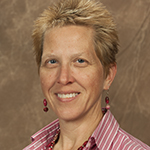Washington University Chancellor Mark S. Wrighton, PhD, has announced that Regina F. Frey, PhD, associate professor of STEM education in the Department of Chemistry in Arts & Sciences and executive director of The Teaching Center, will be installed as the initial Florence E. Moog Professor of STEM Education Thursday, Jan. 31.

The professorship was established to honor Moog, one of Washington University’s most remarkable women scientists, and recognize her significant contributions during her 40-plus years of research and teaching.
It also represents the university’s deep commitment to excel in teaching the disciplines of science, technology, engineering and mathematics (STEM).
“During her tenure here, Florence Moog’s research contributed to important advances in medicine, especially in pediatrics,” Wrighton says. “Today, Gina Frey is advancing the way our faculty teach and our students learn to ensure more successful outcomes for our students, many of them majoring in STEM disciplines.”
Jennifer Smith, PhD, dean of the College of Arts & Sciences and associate professor of Earth and planetary sciences, notes the critical nature of and the need for developing strategic innovations in pedagogy:
“At Washington University, we aspire to combine our research with equally innovative teaching; how better to help our students achieve their full potential? We understand that not all students have the same learning styles and the same level of preparation, particularly in STEM fields. The work that Gina and her colleagues have done and continue to do to enhance learning outcomes for all students is critical in enabling our students to reach their educational and career goals,” Smith says.
In 1994, Frey joined the chemistry department as a lecturer. In addition to teaching general chemistry, she co-developed and co-teaches the “Women in Science” freshman FOCUS course with Barbara Baumgartner, PhD, senior lecturer in the Women, Gender and Sexuality Studies program in Arts & Sciences.
Frey earned a bachelor’s degree in chemistry and mathematics from Clarion University of Pennsylvania and a doctoral degree in physical chemistry from the University of Utah. She was appointed as a postdoctoral fellow for two years at Indiana University, then worked in the technology sector before entering academe.
Since being appointed director of the Teaching Center in 2002, Frey has introduced a host of new methods and diagnostic tools to help faculty in all disciplines improve their teaching effectiveness, and for identifying and supporting under-prepared undergraduates. One of the most effective, research-based models Frey has introduced is Peer-Led Team Learning (PLTL), designed to supplement regular class instruction.
Through her work with the university’s Center for Integrative Research on Cognition, Learning and Education (CIRCLE), Frey and co-director Mark McDaniel, PhD, professor of psychology in Arts & Sciences, lead projects designed to create a bridge for WUSTL faculty and researchers between the cognitive and learning sciences.
“As co-director of CIRCLE, Gina is involved in developing funding initiatives and in fostering research in authentic classroom contexts,” McDaniel says. “She has a sharp appreciation for contemporary themes in cognitive and educational sciences that may hold promise for improving STEM education.
“She also has an extraordinary ability to work with faculty across many disciplines who are attempting to develop and evaluate instructional improvements in their courses. She has a knack for quickly identifying key issues suggesting tractable solutions and working with instructors to set up informative research, and I am delighted that Gina is being installed as the initial Florence E. Moog Professor.”
McDaniel credits Frey with understanding that communication and collaboration are the keys to improved classroom results.
“Gina brings people together who wouldn’t necessarily do so on their own, and that creates an environment to share ideas and evaluate learning approaches,” McDaniel says. “Her recommendations for improving the classroom experience, both for the instructors and the students, are based on solid research.”
McDaniel and Frey recently received a Henry Luce Foundation grant to support an evaluation of learning approaches among students in general chemistry courses, with the goal of first identifying students at risk then devising strategies to support them.
Frey also has received grants from the National Science Foundation, the Howard Hughes Medical Institute Undergraduate Biological Sciences Education Program, and the Hewlett-Packard Technology for Teaching Grant Initiative.
Being passionate about education is something Frey has in common with the late biologist Florence E. Moog, who joined Washington University in 1942 as a research associate in zoology. Moog’s 1948 article, “The Biology of Old Age,” which appeared in the June 1948 issue of Scientific American, won the Westinghouse Prize for distinguished science writing in magazines.
Moog earned an undergraduate degree from New York University and master’s and doctoral degrees from Columbia University.
In the 1950s Moog received international renown for her pioneering research on enzymes in the intestinal tract that became a significant factor in the development of a therapy for stabilizing lung function in premature infants.
During her 42 years at Washington University, Moog taught students in the physiological and biochemical aspects of vertebrate development. In addition, she developed a course on comparative anatomy and embryology for pre-medical students that became a model of its kind throughout the country.
In 1981, she received the university’s Distinguished Faculty Award. Two years later, Moog was honored with the establishment of an endowed scholarship in her name. Today, her legacy endures with a new endowed professorship.
“One of our most critical missions is to ensure that our students are prepared to lead in a future world of rapid changes and increasing complexity, especially in the scientific, technological, engineering and mathematical fields,” Wrighton says. “The Moog professorship underscores our commitment to that mission.”